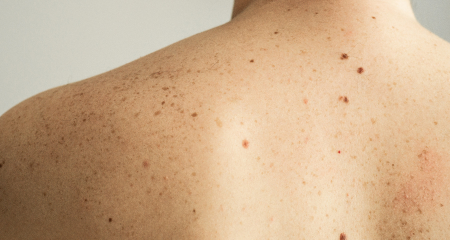
Skin cancer is the most common form of cancer in the United States, with one in three individuals affected in Texas. The board-certified dermatologists at Northstar Dermatology are experts in full-body screenings to detect skin cancer and specialize in the surgical treatment of all skin cancer types. Our team is dedicated to patient education, focusing on prevention and early detection to reduce the risks of developing skin cancer.
As the most prevalent form of skin cancer, basal cell carcinoma is not typically lethal, but if left untreated, it can grow and invade surrounding tissues. It is often caused by prolonged UV exposure from the sun or indoor tanning. Those with lighter skin tones, a history of sunburns, red hair, or freckles may have a higher risk. If you notice a persistent spot or scaly patch, it’s essential to contact a board-certified dermatologist for evaluation.
Squamous cell carcinoma ranks as the second most common skin cancer and is also linked to UV exposure. Unlike BCC, SCC has the potential to spread to other parts of the body, making early detection and treatment critical. Common signs include non-healing spots, scaly patches, or wart-like growths. New or changing spots should be evaluated by a dermatologist.
The physicians at Northstar Dermatology specialize in the surgical treatment of all types of skin cancer. The primary approach is surgical excision, where the dermatologist removes the cancerous tissue along with a margin around the lesion to ensure complete clearance. The area is then closed with sutures, and some downtime is necessary, including restrictions on lifting and physical activity for a few weeks.
For more superficial or early-stage skin cancers, non-surgical options may include electrodessication and curettage or chemotherapy injections. Larger skin cancers, or those located in cosmetically sensitive areas, may require a referral to a Mohs surgeon for specialized surgical removal.
A skin cancer screening is a comprehensive, head-to-toe examination designed to identify any suspicious spots or potential skin cancers. After you’re comfortably placed in a gown, our specialist will conduct a detailed skin assessment, carefully examining any “spots” present. Some lesions may be evaluated with a dermatoscope, a specialized magnifying light that provides a closer view of the skin’s features.
If any lesions appear suspicious or abnormal, your specialist may suggest a skin biopsy to confirm the diagnosis. A biopsy is a quick procedure in which a sample of the lesion is taken and sent to a lab for analysis. During skin cancer screenings, pre-cancerous spots (such as actinic keratoses) and certain benign lesions may also be treated.
Skin cancer screenings focus solely on detecting potential skin cancers and educating patients about the different lesions identified during the exam. Other concerns, like acne or rashes, will generally require a separate appointment.
Skin cancer screenings are beneficial for everyone, no matter the skin type. However, some people have certain features or factors which increase the risk for developing skin cancer:
• Family history of skin cancer
• Personal history of sunburns, especially blistering sunburns
• Personal history of extended sun exposure (working outdoors, outdoor sports, outdoor
recreation such as boating, pool, beach, etc.)
• Personal history of indoor tanning
• Fair complexion
• Red hair or light hair
• A plethora of moles
If any of the above are applicable to you, it is imperative that you request a head-to-toe skin cancer screening
